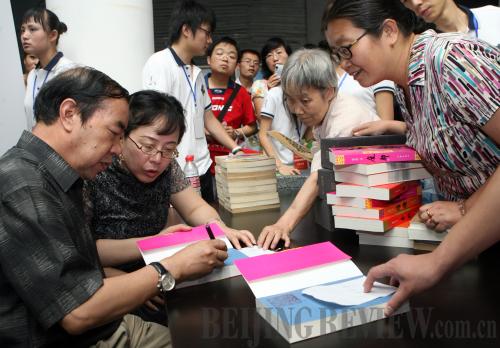|
 |
|
MAKING A MARK: Jia Pingwa (left) signs his trilogy—The Abandoned Capital, Turbulence and Qin Qiang—after The Abandoned Capital was republished as part of the collection in Xi'an on August 8, 2009 (CFP) |
The translation of Chinese writer Jia Pingwa's controversial novel The Abandoned Capital was recently completed by Chinese and English scholars.
"There should be more outstanding Chinese novels reaching world readers," said Hu Zongfeng, Vice Dean of the School of Foreign Studies, Northwest University in Xi'an in northwest China's Shaanxi Province, and also one of the two translators, on July 24.
According to Hu, his partner, British scholar Robin Gibank, had taken the translated text to his teacher, a famous critic in the U.K., for further refining.
Hu cooperated with Gibank for three years, translating the once banned novel into English, which should be published by the end of this year.
Background
In 1993, The Abandoned Capital was first serialized in October, a bimonthly literature magazine based in Beijing. Later it was released by Beijing Publishing House with a first run of 500,000 copies. With its publication, the novel immediately drew tremendous attention across Chinese society for its bold sexual depictions, making Jia the center of much controversy and criticism.
"The shadow of the novel haunted me during all of the 1990s and even today, which has affected me a lot," said Jia.
He said that a lot of readers and critics labeled his novel vulgar and accused him of being an indecent rogue, mainly due to its sexual content.
Set in Xi'an, capital city of Shaanxi Province, the novel centers on the life of its hero Butterfly and his affairs with several women. It gives a vivid description of Chinese society in the 1980s.
Before this novel, Jia was already a well-known writer. Unlike his previous works about peasantry in northwest China, The Abandoned Capital has an urban setting. It sensitively captured the latest changes in Chinese society, and described the mental states of intellectuals in reaction to this.
"The Abandoned Capital reflects the collapse of an era and a distrust in faith. The book reached a new height in interpreting the destiny of intellectuals and their predicaments," commented Xie Youshun, a literary critic from Zhongshan University in south China's Guangdong Province.
However, the novel was banned in 1993 for its bold sexual depictions.
Despite this, pirate versions were widely available. It was so popular that Jia estimated that at least 12 million copies had been sold. Meanwhile, the novel was well received abroad and won the Prix Femina award, a French literary award, on November 3, 1997. It has been translated into several languages, including Japanese, French and Russian.
"The novel has attracted overwhelming attention. Many critics wrote articles on it," said Jia.
"But it was soon banned. Later, it was released in Hong Kong, but many parts were removed. In the second half of 1993, the whole nation was debating the book," Jia said.
The banning of the novel has always been a sore issue. It was not revoked until July of 2009.
Jia explained that acceptance of the republished novel was a reflection of modern society and showed that China's literary circle had improved.
"A book's fate reflects the track of social progress," the writer said, talking about his book just like a child. "Over the past years, social values have gradually changed, and people's knowledge about literature has also been enhanced."
When The Abandoned Capital was first published, Chinese society was considered conservative, with novels depicting sexual scenes able to cause a sensation.
| 